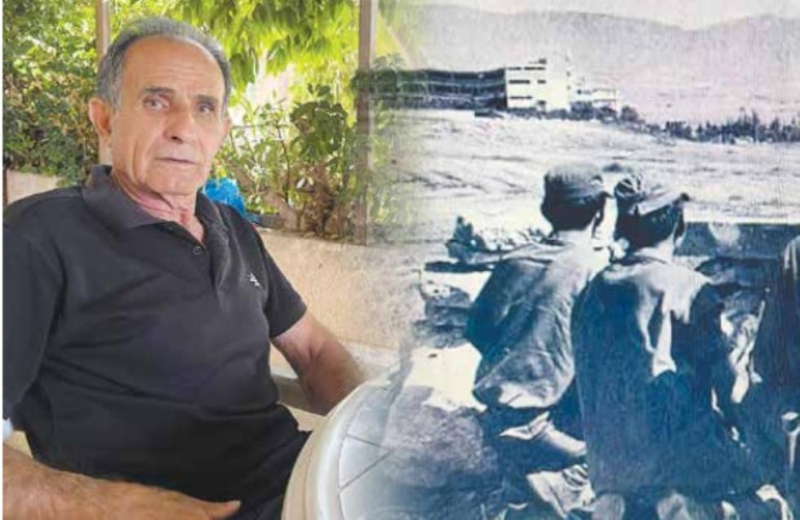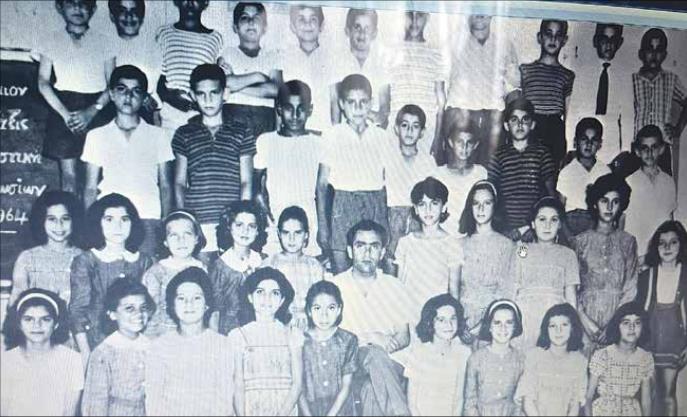
A man whose “borders are not here”
Giorgos Georgiou Landakis originally from Famagusta and now a resident of Limassol when he was a 20-year-old soldier on the front line of the war, in 1974, he wrote with white and blue paint the emblematic slogan “Our borders are not here” on the Kolokasidi roundabout. He turned 70 this year. This year marks 50 years since that summer.
The semiotics of the slogan
The iconic slogan at the Kolokasidis roundabout, with which the entire post-war Cyprus grew up, on which day did he write it, I ask him. Does he remember? “Of course I remember. It was shortly after the ceasefire and after the situation on the hill had been normalized, he had a carpentry shop, a pelican as we say in Cypriots, with various machines, a shack with tins was the basics. One day while I was rummaging I found some paints. I chose a blue and a white paint and went to the familiar spot and wrote in big letters that “Our border is not here.” Some time later someone else added that “he is in Kyrenia”. The motto is still there, they give it a fresh coat of paint from time to time.” Nice talk that our border is not here, it can metaphorically mean many things, I tell him. “That's exactly why I wrote it. Because it has both a literal meaning for the place where it is located and a metaphorical one”.
Childhood in Agios Sergios
Mr. Giorgos has always had an artistic nature. Whether playing music as a rock guitarist in the underground band Black Stones as a carefree teenager in Famagusta, painting or writing, he has always been a restless spirit. Creative. Currently, he is writing. “I am writing about my childhood in the village, specifically in Agios Sergios Famagusta where I spent summers, Christmas and Easter as a small child. I was having an amazing time,” he begins, using a seductive version of the Cypriot dialect, which has begun to decline these days. The lowland area there, he recalls, was full of fig trees, olives and vegetables with tomatoes, cucumbers, melons and watermelons. Mostly that was the life of the people back then, he remembers. Vegetables and grains. I ask him if he thinks that as a small child he had a better time than his now twelve-year-old granddaughter. “I think so,” he replies. “Children today are constantly fixed in front of a device which does not give them any sense of joy and communication with the outside world. We were free, it was a nicer time I think. We had nature, we ate from the vegetables, we played endless hours outside the house. We were probably the last generation to enjoy healthy, nutritious food.”

On the front line
Mr. Giorgos Georgiou was on the front line of the war for ten months. Ten whole months. From the sea, the music, the loves and the big dreams of his young life in Famagusta, he found himself, suddenly one morning, on the barbaric front line of the war. He was only 21 years old. How did the disk drives end up in the war zone? “I will answer you with a simple sentence: Let the culprits be blamed. They know who I'm talking about and there is endless evidence about who the perpetrators are who today have the audacity to make the victims”.
“All of us conscripts from Famagusta gathered initially in the area of Karaolos where there was a forest with eucalyptus trees. That's where all the treachery came from. There was not a single officer, no armament, nothing. Famagusta was evacuated based on the junta's plan. In the afternoon we were transported to Nicosia by trucks. From Nicosia they took us to the hill of Koutsoventis, located on the southern outskirts of Pentadaktylos. We stayed there for 21 days, where the Turks beat us mercilessly. On the evening of the 21st day, they gathered us, brought young men who were conscripts and left us who were now considered reserves and took us to Cheri. The second invasion found me in Cherry. They put us back in the trucks and took us to Nicosia, via Strovolos. Where the Priestly School is, they took us down to the street and on foot we reached the Kolokasidis roundabout. We stayed under a shed and an officer came and called us by name you, you, you and you, twelve people in total he shouted at us, move forward”.
I ask him by what criteria they sent these twelve forward. However, they did not have greater skills, experience or better equipment than the rest, he assures me. “I don't know if it was accidental. Maybe yes. The reality is that when we were in Cheri they had called almost the same people by name again”.
After the fierce battles of the Gregorian School, which were among the fiercest of the invasion, the battalion headed to the hill of Mont Parnas. “We sat down to eat and I remember being knocked out and having blood on me because I was injured. I also remember that he had a case of tomatoes, almost rotten but we ate them with great appetite. At some point an officer came and said, you, you and you, almost the same names again, let's go to the airport”.
But how would they get into the airport? “We have a white landrover, if you enter, the Turks will take you for the United Nations and they won't shoot you” (s.s. laughs at this point as well). “We entered the carnage like vultures in the landrover and went unscathed to the Kaisi factory that made bus bodies. At night, when it got dark, an officer came and called four or five people, together with two other squids, they were lieutenants, I don't know, I don't remember well, but it was me too, you will go across, he told us, where are the Turkish lines and those wounded or dead find bring them. We went at night, found two dead, brought them back, the same night, again the same people. That's why I tell you, it was circumstantial, accidental, I don't know”.
Warlike human nature?
Back at the plastic table on the balcony, in his house in the district of Agios Spyridon, in the west of Limassol, where we are talking, I ask him if, on the occasion of the many deadly bloody conflicts that have never stopped taking place and which nowadays are even at their peak, if he believes , as a person who experienced war firsthand, whether the human condition is ultimately by nature and inevitably warlike. “Yes, it is in our nature, unfortunately, but not of the everyday person, as you put it to me, but of the various orders that over time suffocate the common man. That is, those who move the strings and are behind the big geopolitical and economic interests. Unfortunately, humanity has not yet grasped the meaning and continues to suffocate under flags, nations, religions and symbols.
As someone who experienced the trauma of war at a tender age, how did it affect him? “It turned my whole life upside down. Whole. It destroyed my being, my wants, my beliefs. He forced us to become everyone's burden. He didn't let us realize what we dreamed of. The war had a catalytic effect on my entire subsequent course,” he notes.
I wonder if the war experience made him more sensitive as an artist. Writing, music, painting, Mr. Georgiou never stopped doing even one of these three, regardless of whether he and his family's livelihood came from the nursery he maintains with his wife in Limassol and from his work for years as a gardener, which as activities undoubtedly involve the artistic and creative element. “I don't think the war affected me in my art. This was something I seem to have innately had from a young age. So you can understand, a few days after the armistice, I had started painting on the hill I was on. I also had my guitar with me. What affected me is that we lost the place we were born, our loves, our childhood, our carefree, our friends. The most tragic thing of all was that in the war I also lost my childhood and brotherly friend, Andreas Dimitriou”. “It's not a question of whether the state will honor me”, he answers immediately and boldly. “I'm not one of those people who believe that if you do your duty you deserve a medal. What probably makes me bitter and saddens me is that in the end the awards were given to those who caused the evil”.




